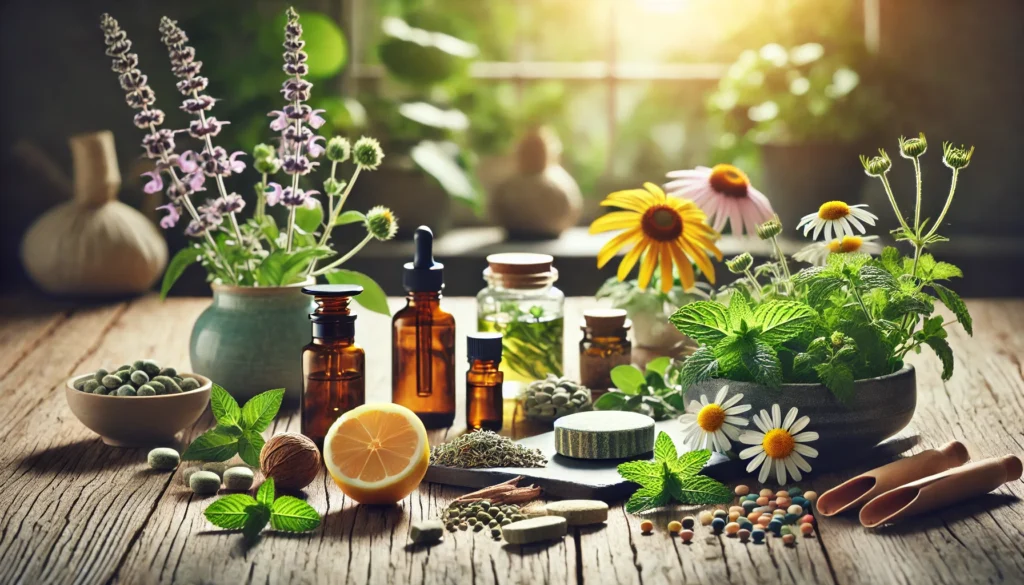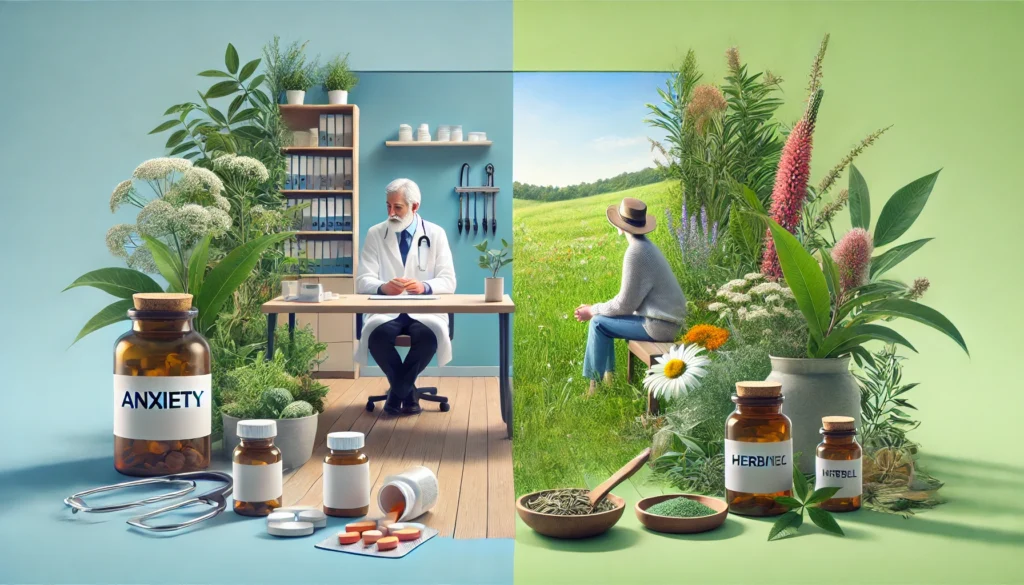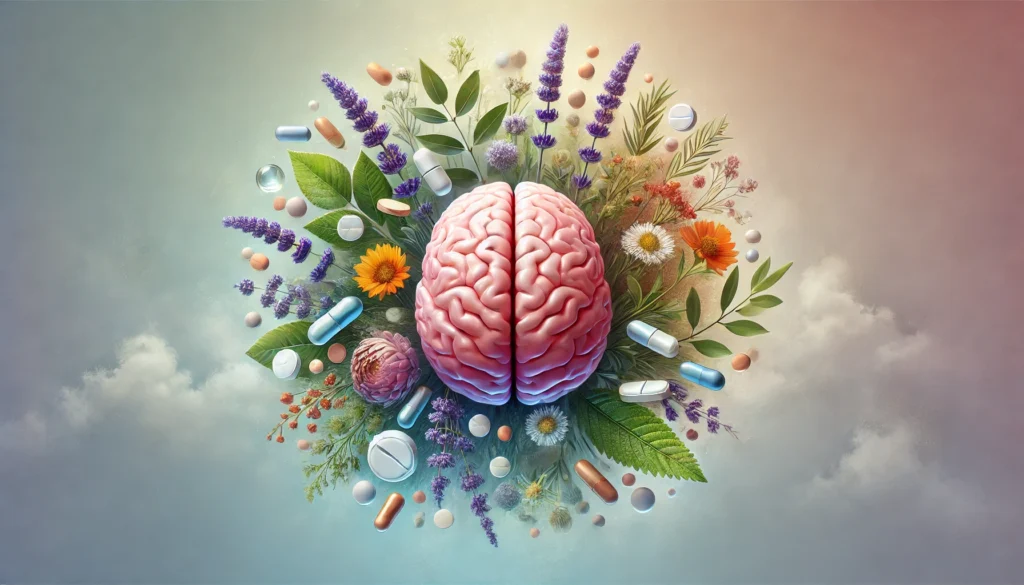Introduction
Anxiety disorders are among the most prevalent mental health conditions worldwide, affecting millions of individuals annually. Recent advancements in the understanding and treatment of anxiety have led to the development of new anxiety medications, providing hope for those seeking effective relief from their symptoms. As medical science continues to evolve, so too do the options available for managing anxiety, ranging from traditional medications to newer, more targeted drugs. However, many individuals are increasingly looking for complementary treatments that offer natural, holistic alternatives to prescription medications. This growing interest in herbal remedies and holistic supplements presents an intriguing question: Can these natural approaches support the effectiveness of new drugs for anxiety disorders, and perhaps offer relief in conjunction with traditional treatments?
You may also like: Best Herbal Alternatives to Anxiolytics: Natural Remedies for Anxiety Relief
While new drugs for anxiety are making significant strides in the field of mental health, it is crucial to explore how these medications work alongside alternative therapies. Herbal remedies and adaptogens, such as valerian root, ashwagandha, and chamomile, have been shown to offer calming effects, reduce stress, and even help individuals manage symptoms of anxiety. By examining the potential synergy between these natural treatments and new pharmaceutical options, we can gain a deeper understanding of how they can work together to support mental wellness and improve overall outcomes for those struggling with anxiety disorders.
In this article, we will delve into the emerging landscape of anxiety treatment, exploring the latest developments in new drugs for anxiety, while also examining the potential role that herbal remedies and holistic supplements play in enhancing these treatments. We will also discuss the importance of taking a personalized approach to anxiety management, considering both the benefits and limitations of combining medications with natural alternatives.
The Rise of New Anxiety Medications
The landscape of anxiety treatment has evolved significantly over the past few decades, with a variety of new medications becoming available to help individuals manage their symptoms. These new anxiety medications often offer unique mechanisms of action, targeting specific neurotransmitters and receptors in the brain that influence mood and anxiety levels. For example, selective serotonin reuptake inhibitors (SSRIs) and serotonin-norepinephrine reuptake inhibitors (SNRIs) have long been considered first-line treatments for anxiety disorders. However, the latest generation of medications promises even more targeted effects, minimizing side effects and improving efficacy.
New drugs for anxiety have been developed with a focus on better understanding the underlying biological mechanisms that contribute to anxiety. One such example is the use of gamma-aminobutyric acid (GABA) agonists, which enhance the inhibitory neurotransmitter GABA’s effects in the brain, helping to reduce the overstimulation that leads to anxiety. These newer medications work by fine-tuning brain chemistry in a way that traditional benzodiazepines or SSRIs may not.
Another exciting development in the treatment of anxiety is the emergence of drugs that target the brain’s endocannabinoid system. Cannabinoids, such as cannabidiol (CBD), have shown promise in reducing anxiety and promoting relaxation, without the intoxicating effects of THC. The potential for these new drugs to be used in conjunction with traditional medications could pave the way for a more comprehensive treatment approach.
Despite the positive strides made with these new drugs for anxiety, there remains a strong desire among patients to explore alternative treatments that carry fewer side effects or do not require long-term reliance on pharmaceuticals. This is where herbal remedies and holistic supplements come into play.

Herbal Remedies and Adaptogens: Nature’s Calm
Herbal remedies and adaptogens are a class of natural substances that have been used for centuries to promote wellness and manage stress. Adaptogens are plants or herbs that help the body adapt to stress and restore balance to its physiological systems. They work by regulating the body’s stress response and helping to mitigate the effects of both physical and mental stress. Some of the most well-known adaptogens for anxiety include ashwagandha, rhodiola rosea, and holy basil.
Ashwagandha, a staple in Ayurvedic medicine, has been shown to reduce stress and anxiety by modulating cortisol levels, the body’s primary stress hormone. Studies have found that ashwagandha supplementation can significantly reduce anxiety symptoms, with some evidence suggesting it is as effective as traditional anti-anxiety medications. Similarly, rhodiola rosea, another adaptogen, has been found to enhance mental performance, reduce fatigue, and improve symptoms of anxiety. It is particularly useful for individuals who experience stress-related fatigue, which often accompanies chronic anxiety.
Holy basil, or tulsi, is another herb used in traditional medicine systems to reduce stress and anxiety. It is believed to have a calming effect on the nervous system, helping individuals manage anxiety without the sedative effects associated with some pharmaceutical drugs. Recent studies have confirmed its ability to lower stress and reduce anxiety levels, making it an excellent option for those seeking natural relief.
These herbal remedies not only provide relief from anxiety but also have a range of other health benefits. For example, ashwagandha has been shown to improve sleep quality, enhance cognitive function, and even support immune health. When combined with new anxiety medications, these herbs may offer a holistic approach to managing anxiety that addresses both the mental and physical aspects of the condition.
Synergy Between New Anxiety Medications and Herbal Supplements
While new drugs for anxiety have brought about significant advancements in the treatment of anxiety disorders, the potential for synergy between these medications and herbal remedies is an exciting area of research. Many individuals seek to integrate natural treatments with traditional medications, hoping to reduce side effects or enhance the effectiveness of their prescribed drugs. However, it is important to approach this combination carefully and consult with healthcare professionals to ensure that the treatments are compatible.
Research into the interaction between new anxiety medications and herbal remedies is still in its early stages, but preliminary findings suggest that certain adaptogens may complement the effects of pharmaceutical drugs. For example, some studies have shown that combining ashwagandha with SSRIs or SNRIs can enhance the antidepressant effects of the medication, leading to better overall outcomes for individuals with anxiety and depression. The calming effects of herbs like valerian root, chamomile, and lavender may also work synergistically with anti-anxiety medications, promoting relaxation and reducing the overall anxiety experience.
However, it is important to note that not all herbal remedies are suitable for use in conjunction with prescription medications. For example, St. John’s wort, a popular herbal remedy for depression, is known to interact with a wide range of medications, including antidepressants. Therefore, it is crucial for individuals to consult with a healthcare provider before combining herbal supplements with new drugs for anxiety, as certain combinations could lead to adverse effects or reduce the efficacy of the medications.

The Role of Holistic Supplements in Anxiety Treatment
In addition to herbal remedies, holistic supplements such as magnesium, omega-3 fatty acids, and B vitamins play an important role in supporting mental health and managing anxiety. These supplements work by providing essential nutrients that support the brain and nervous system, helping to regulate mood and improve overall mental wellness.
Magnesium is one of the most important minerals for brain health, and deficiencies have been linked to increased anxiety and stress. Studies have shown that magnesium supplementation can help reduce symptoms of anxiety by improving the function of the GABA receptors in the brain, which play a key role in calming the nervous system. Similarly, omega-3 fatty acids, which are found in fish oil and flaxseed, have been shown to reduce inflammation in the brain and improve mood regulation. Incorporating these supplements into an anxiety treatment plan may enhance the benefits of new anxiety medications, leading to a more comprehensive approach to managing the disorder.
B vitamins, particularly B12 and folate, are also essential for mental health, as they support the production of neurotransmitters such as serotonin and dopamine. These vitamins have been shown to reduce symptoms of depression and anxiety, and deficiencies in these nutrients have been linked to an increased risk of developing anxiety disorders. By addressing any deficiencies in these vitamins, individuals may experience better results from both pharmaceutical treatments and holistic supplements.
Frequently Asked Questions (FAQ)
1. What are the latest advancements in new anxiety medication?
Recent developments in the realm of new anxiety medications focus on improving efficacy while reducing side effects. New drugs for anxiety aim to target specific neurotransmitters like serotonin, norepinephrine, and GABA to help regulate mood and reduce anxiety. One promising area is the use of endocannabinoid-based treatments, such as cannabidiol (CBD), which show potential in reducing anxiety symptoms without the intoxicating effects associated with THC. Moreover, medications like SSRIs and SNRIs are being refined to minimize common side effects, such as sexual dysfunction or weight gain. The ongoing research into these new drugs for anxiety suggests that future treatments could be even more effective and personalized, potentially offering tailored therapies based on individual brain chemistry.
2. How do new drugs for anxiety disorder differ from older medications?
New drugs for anxiety disorder typically offer more targeted mechanisms of action compared to older medications, such as benzodiazepines or tricyclic antidepressants. While older anxiety medications often have broader effects on brain chemistry, newer treatments are designed to influence specific receptors or neurotransmitters involved in anxiety regulation, such as serotonin or GABA. This targeted approach can result in fewer side effects and better overall outcomes. For instance, some new anxiety medications may work by enhancing the function of the endocannabinoid system, helping regulate stress and mood with minimal sedation. These advances reflect a deeper understanding of the biological basis of anxiety and offer a more refined approach to treatment.
3. Can new anxiety medications be used alongside herbal remedies?
Yes, it is possible to use new anxiety medications alongside herbal remedies, but it should always be done under the supervision of a healthcare provider. Many herbal remedies, such as ashwagandha and valerian root, have calming effects and may help alleviate anxiety symptoms. However, it is crucial to be cautious when combining these treatments with prescription medications, as some herbal supplements can interact with pharmaceutical drugs, potentially reducing their effectiveness or causing side effects. For example, some herbs may influence liver enzymes that metabolize medications, which could alter the drug’s potency. Consulting a healthcare professional ensures that the combination of new drugs for anxiety and herbal remedies is safe and beneficial.
4. What role do adaptogens play in managing anxiety?
Adaptogens, a class of herbs that help the body adapt to stress, can play a supportive role in managing anxiety. Herbs like rhodiola rosea, holy basil, and ashwagandha are known to modulate the body’s stress response, enhancing the body’s ability to cope with anxiety and mental fatigue. These adaptogens work by regulating cortisol levels and supporting the adrenal system, which is critical for managing stress. When combined with new drugs for anxiety, adaptogens may help enhance the calming effects of medications, leading to a more holistic and balanced treatment approach. Adaptogens can also be used to address the long-term, chronic nature of anxiety, promoting resilience and overall mental well-being.
5. Are there any potential side effects when using new drugs for anxiety and natural supplements together?
While the combination of new drugs for anxiety and natural supplements can be beneficial for many, there are potential side effects to consider. For example, certain herbal supplements, like St. John’s wort, can interfere with the way medications are metabolized, potentially reducing their effectiveness or increasing side effects. Additionally, both medications and supplements can have sedative effects, and using them together may lead to excessive drowsiness or difficulty concentrating. It’s also essential to consider the individual’s specific health profile—those with underlying conditions like liver disease or kidney problems should exercise extra caution. Always consult with a healthcare provider before combining these treatments to ensure safety and avoid adverse interactions.
6. How do new anxiety medications compare to therapy for treating anxiety?
New anxiety medications are often used in conjunction with therapy to provide a comprehensive approach to treating anxiety. While new drugs for anxiety can help regulate brain chemistry and reduce immediate symptoms, therapy, such as cognitive behavioral therapy (CBT), focuses on addressing the underlying thought patterns and behaviors contributing to anxiety. Medications may provide short-term relief, but therapy offers long-term solutions by equipping individuals with coping strategies and tools for managing anxiety. Combining both approaches can be especially effective for people with moderate to severe anxiety disorders, offering both immediate relief and lasting improvements in mental well-being.
7. What are some herbal supplements that can support the effectiveness of new anxiety medications?
Several herbal supplements may complement the effects of new anxiety medications by promoting relaxation and reducing stress. Valerian root, for example, has been shown to have calming effects, making it a popular choice for individuals experiencing anxiety or sleep disturbances. Similarly, chamomile is widely used for its gentle sedative properties, helping to calm the nervous system without the side effects of stronger pharmaceutical sedatives. Adaptogens like ashwagandha and rhodiola rosea can also enhance the body’s ability to cope with stress, which may help individuals feel more resilient while on anxiety medication. When combined carefully with new drugs for anxiety, these natural supplements may improve overall treatment outcomes.
8. Are there risks associated with using CBD alongside new drugs for anxiety?
While cannabidiol (CBD) is generally considered safe and has shown promise in reducing anxiety, there are risks when combining CBD with new drugs for anxiety. CBD can interact with certain medications by affecting liver enzymes responsible for metabolizing drugs. This could either enhance or diminish the effectiveness of anxiety medications, depending on the drug. For example, CBD may increase the concentration of some medications in the bloodstream, leading to a higher risk of side effects. It is essential to monitor how CBD affects the body and adjust medications accordingly, with guidance from a healthcare provider.
9. How long does it typically take for new anxiety medications to work?
The time it takes for new anxiety medications to show results can vary depending on the specific drug and individual factors, such as the severity of the anxiety disorder and how the body responds to the treatment. Generally, new drugs for anxiety, such as SSRIs or SNRIs, may take between 4 to 6 weeks to produce noticeable effects, as these medications work by gradually adjusting neurotransmitter levels in the brain. Some newer treatments, like those targeting the endocannabinoid system or GABA receptors, may offer more immediate relief, but individual experiences can differ. It’s important to have realistic expectations and work closely with a healthcare provider to assess progress and make adjustments as necessary.
10. Can new anxiety medications help people with both anxiety and depression?
Yes, many new drugs for anxiety are also effective in treating co-occurring depression, as the symptoms of anxiety and depression often overlap. Medications like SSRIs and SNRIs are commonly prescribed for both conditions due to their ability to regulate serotonin and norepinephrine levels, neurotransmitters that play a role in mood regulation. Newer anxiety medications, such as those targeting specific receptors or brain systems, may also offer dual benefits for both anxiety and depression. When used alongside therapeutic interventions, these medications can help individuals address both the emotional and psychological aspects of their mental health, providing a comprehensive approach to managing anxiety and depression simultaneously.

Conclusion: A Comprehensive Approach to Anxiety Management
The treatment of anxiety has evolved significantly in recent years, with new drugs for anxiety offering more targeted and effective options for individuals struggling with the condition. However, the growing interest in herbal remedies and holistic supplements suggests that a combined approach may offer even greater benefits. By integrating these natural treatments with new medications, individuals may be able to reduce side effects, improve efficacy, and achieve better overall results in managing their anxiety.
While the scientific evidence supporting the combination of new anxiety medications and herbal remedies is still emerging, the potential for synergy between these approaches is an exciting prospect. As always, it is important to consult with a healthcare provider before combining treatments to ensure safety and effectiveness. With a personalized approach to anxiety management, individuals can find a treatment plan that works best for their unique needs, allowing them to live a healthier, more balanced life.
anxiety relief supplements, natural anxiety remedies, adaptogens for stress, stress reduction herbs, managing anxiety naturally, calming herbs for anxiety, holistic anxiety treatments, herbal anxiety remedies, CBD for anxiety, GABA and anxiety, anxiety medications alternatives, herbal stress relievers, reducing anxiety without medication, anxiety management supplements, calming natural supplements, benefits of ashwagandha for anxiety, valerian root for anxiety, omega-3 for mental health, magnesium for anxiety relief, cognitive function supplements for anxiety, supporting mental wellness naturally
Further Reading:
Natural Remedies to Alleviate Anxiety
Nutritional and herbal supplements for anxiety and anxiety-related disorders: systematic review
Disclaimer
The information contained in this article is provided for general informational purposes only and is not intended to serve as medical, legal, or professional advice. While NewsHealthWatch strives to present accurate, up-to-date, and reliable content, no warranty or guarantee, expressed or implied, is made regarding the completeness, accuracy, or adequacy of the information provided. Readers are strongly advised to seek the guidance of a qualified healthcare provider or other relevant professionals before acting on any information contained in this article. NewsHealthWatch, its authors, editors, and contributors expressly disclaim any liability for any damages, losses, or consequences arising directly or indirectly from the use, interpretation, or reliance on any information presented herein. The views and opinions expressed in this article are those of the author(s) and do not necessarily reflect the official policies or positions of NewsHealthWatch.

